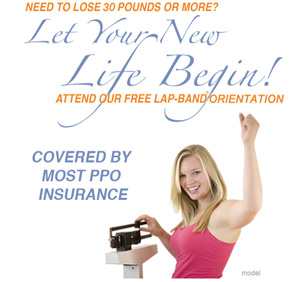The U.S. Food and Drug Administration is taking action against eight surgical centers that perform LAP-Band surgeries in California. The FDA says the clinics, along with the marketing firm 1-800-GET-THIN LLC, are misleading consumers with an ad campaign on highway billboards and advertising inserts. The agency says that the 1-800-GET-THIN ads do not properly communicate the risks associated with gastric surgery and for making inflated weight loss claims.
The ads feature thin women and slogans like “Your New Years Resolution Now!” and “Lose Weight With The LAP-Band.” The company is also offering complementary insurance-checks.
The LAP-Band is an adjustable device which is implanted around the stomach of obese patients, effectively creating a smaller stomach pouch and helping patients feel full more easily. The FDA warns that individuals should thoroughly discuss the benefits and drawbacks of this kind of invasive surgery. “It’s particularly troublesome when advertisements don’t communicate the serious risks associated with medical devices,” said Steve Silverman, director of the Office of Compliance in the FDA’s Center for Devices and Radiological Health in a statement.
In response, 1-800-GET-THIN LLC issued a statement on their website, saying that they support a full disclosure policy and that “1 800 GET THIN and the FDA are unified in their goals of ensuring that all consumers are well informed and educated about the Lap Band medical device.” The statement further assures readers that anyone who calls for information regarding the LAP-Band is referred to a licensed physicians.
However, the media attention has revealed that there are further concerns about the quality of care administered at the medical facilities associated with 1-800-GET-THIN. Four patients in Southland died after receiving the LAP-Band, and a fifth case is still being investigated.
Los Angeles County Board of Supervisors has scheduled a hearing for tomorrow, to address concerns about the bill boards. The County Supervisors will be considering if there is a way to insure “truthful advertising” without violating first amendment rights.
Also Read:
Number of Adjustments Found to Be Key for LAP-Bands Success

